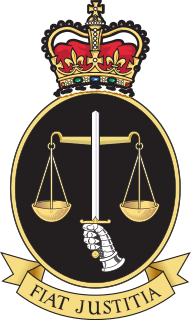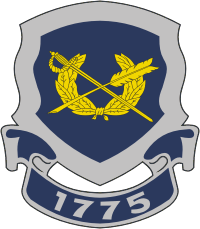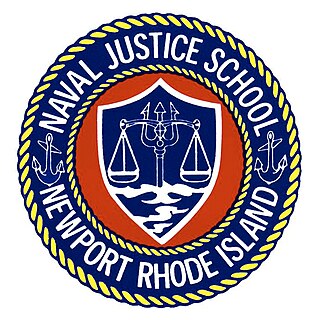
The Judge Advocate General's Corps is the branch or specialty of a military concerned with military justice and military law. Officers serving in a JAG Corps are typically called judge advocates. Only the chief attorney within each branch is referred to as the Judge Advocate General; however, individual JAG Corps officers are colloquially known as JAGs.

The Judge Advocate General's Corps, also known as the "JAG Corps" or "JAG", is the legal arm of the United States Navy. Today, the corps consists of a worldwide organization of more than 730 commissioned officers serving as judge advocates, 30 limited duty officers (law), 500 enlisted members and nearly 275 civilian personnel, all serving under the direction of the Judge Advocate General of the Navy.

The Judge Advocate General's Corps also known as the "JAG Corps" or "JAG" is the legal arm of the United States Air Force.

The judge advocate generalof the Canadian Forces is the senior legal officer who superintends the administration of military justice in the Canadian Armed Forces, and provides legal advice on military matters to the governor general, the minister of national defence, the Department of National Defence and the Canadian Armed Forces. The office is defined in section 9 of the National Defence Act.

William Kent Suter is an American jurist who served as the 19th Clerk of the Supreme Court of the United States, a position he held for twenty-two years. Prior to this, he was a major general in the United States Army; at the time of his retirement in 1991, he had served for over a year as the acting Judge Advocate General.

The United States Army Trial Defense Service is an independent Field Operating Agency within the U.S. Army Judge Advocate General's Corps and falls under the Commanding General of the U.S. Army Judge Advocate General's Legal Center and School. The TDS motto is "Defending Those Who Defend America."
The United States Marine Corps' Judge Advocate Division serves both to advise the Commandant of the Marine Corps (CMC) and other officials in Headquarters, Marine Corps on legal matters, and to oversee the Marine Corps legal community. The head of the Judge Advocate Division (JAD) is the Staff Judge Advocate to the Commandant.
The Basic Officer Leader Course (BOLC) is a two-phased training course designed to commission officers and prepare them for service in the United States Army. Prospective officers complete Phase I as either a cadet or an officer candidate before continuing on to BOLC B as Second Lieutenants. If BOLC B is not completed within two years of commissioning, 2LTs will be administratively separated from the service unless there are extenuating circumstances. This a progressive model designed to produce US Army officers with leadership skills, small unit tactics and certain branch-specific capabilities.

The Judge Advocate General's Legal Center and School, also known as The JAG School, is a graduate-level division federal service academy located on the grounds of the University of Virginia in Charlottesville, Virginia. The center is accredited by the American Bar Association to award the Master of Laws (LL.M.) degree in Military Law. The center educates military, civilian, and international personnel in legal and leadership skills. The LL.M. curriculum includes courses in Administrative and Civil Law, Contract and Fiscal Law, Criminal Law, and National Security Law. The school serves primarily as the U.S. Army's law school for the Officer Basic Course (OBC) for initial-entry Judge Avocates, and as the graduate program for Judge Advocates of all services branches. It is the only ABA-accreditated law school that only awards an LL.M. and not a Juris Doctor degree.
Michael Chapman is an American lawyer, and former senior officer in the United States Army's Judge Advocate General corps, who was appointed the legal adviser to the Office of Military Commissions, in Guantanamo on September 19, 2008. According to the official press release that announced his appointment his previous appointments included being:
Lisa M. Schenck is an American attorney, academic, and Judge of the United States Court of Military Commission Review. She has served as the associate dean for academic affairs at the George Washington University Law School since 2009. In March 2010, Schenck was appointed as a professorial lecturer in law, and teaches military justice. Prior to her career in academia, Schenck served in the United States Army Judge Advocate General's Corps for more than 25 years.

The Naval Justice School (NJS) is an educational institution of the United States Navy whose mission is to instruct Navy, Marine Corps, and Coast Guard officers and enlisted personnel in the fundamental principles of military justice, civil and administrative law, and procedure. In addition to being licensed attorneys in any state or territory of the U.S., all attorneys in the Judge Advocate General's Corps must undergo training either in this institution, or in the complementary institutions of the U.S. Army and the U.S. Air Force, allowing them to act as trial or defense counsel at military courts-martial.

David Edward Coombs is a United States military defense counsel known for his role in several high-profile cases.

William Parnell Greene Jr. is a former Judge of the United States Court of Appeals for Veterans Claims.
The Judge Advocate General Branch of the Pakistan Armed Forces is composed of Pakistan's Military senior officers, lawyers and judges who provide legal services to the Army, Air Force, Navy, and Marines at all levels of command. JAG branch comes directly under the Law Directorate of the army. The Judge Advocate General's Legal Service includes judge advocates, warrant officers, paralegal noncommissioned officers and junior enlisted personnel, and civilian employees. In Pakistan, the Judge Advocate General can have the rank of Lieutenant-General, Major or Brigadier-General. The JAG is currently led by the combined Pakistan Armed Forces's senior-rank officers that includes the Vice Admirals of the Navy, Air Marshals of the Air Force, and the Lieutenant-Generals of the Army whose names are kept highly classified.

Major General Clyde J. "Butch" Tate II, USA is an American military lawyer who previously served as the 19th Deputy Judge Advocate General of the United States Army. Major General Tate graduated from the University of Kansas in 1979, receiving a commission through R.O.T.C. as a Second Lieutenant in the U.S. Army. He deferred entry to active duty in order to attend the University of Kansas School of Law. Major General Tate also holds master's degrees in Military Law and National Security Strategy. He attended the Judge Advocate Basic and Graduate Courses, the Army Command and General Staff College, and the National War College.
The Judge Advocate General's Corps, also known as JAG or JAG Corps, is the military justice branch or specialty of the U.S. Air Force, Army, Coast Guard, and Navy. Officers serving in the JAG Corps are typically called judge advocates.

Vice Adm. James Walter Crawford III is a university administrator former United States Navy officer, serving for 34 years before retiring. He is currently the president of Felician University in New Jersey, having assumed the role in June 2021.

Charles Nicholas Pede is a military lawyer and retired United States Army lieutenant general who last served as the 40th Judge Advocate General of the United States Army. Pede was promoted from the rank of brigadier general to the rank of lieutenant general, bypassing the rank of major general on July 26, 2017.

Patrick Finnegan was a United States Army Brigadier General, and the president of Longwood University. Finnegan served 39 years in the U.S. Army, retiring in 2010 after serving as the 12th Dean of the Academic Board at the U.S. Military Academy. Following his Army career, he was appointed as the 25th President of Longwood University in 2010. Finnegan stepped down as President in 2012 due to health reasons, and returned to private life.















